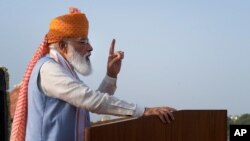Indian Prime Minister Narendra Modi on Sunday announced plans to spend $1.35 trillion on building modern infrastructure to give a fillip to the economy and said the country will move toward greater use of clean energy to achieve its climate goals.
The announcement came during an address to the nation during the country’s Independence Day celebrations.
Speaking from the ramparts of the historic Red Fort in New Delhi amid tight security, he said the infrastructure plan to be launched soon will “create employment opportunities for hundreds of thousands” and make local industries globally competitive.
He also said that his government will boost manufacturing and exports and encourage homegrown industries to ensure that economic benefits trickle down to villages and towns.
Modi swept to power seven years ago on the promise of spurring India’s development and creating employment avenues for young Indians. However, critics say that promise has remained elusive as the Indian economy, once the world’s fastest growing, has lost much of its sheen in recent years.
While the economy was faltering even before the pandemic, strict lockdowns in the past year in the world’s second worst hit country have worsened the situation – it contracted by 7.3% in the last financial year.
Millions of jobs have been lost during the pandemic according to the Center for Monitoring the Indian Economy, an independent think tank. Studies say tens of thousands have been pushed into poverty.
Modi also unveiled plans to make India, one of the world’s biggest oil importers, energy independent over the next 25 years, a target which he said would help in meeting the country’s goals of shifting to clean energy.
“India is moving fast toward achieving its climate goals,” according to Modi.
He said the country would give an impetus to electric mobility and focus increasingly on use of natural gas and hydrogen to generate renewable energy.
During his address, Modi paid tributes to those who have died of the coronavirus, saying "the pain of losing them will stay with us forever.”
Praising health care workers and scientists for their contribution during the pandemic, he said the country worked with “extraordinary pace” in every area during the crisis.
Nearly two-thirds of the 430,000 deaths due to COVID-19 that India has recorded took place during a lethal second wave in which the country’s health infrastructure was overwhelmed. A huge shortage of oxygen and hospital beds, even in cities like New Delhi, with the country’s best medical infrastructure, left many families struggling to get oxygen supplies and hospital beds.




